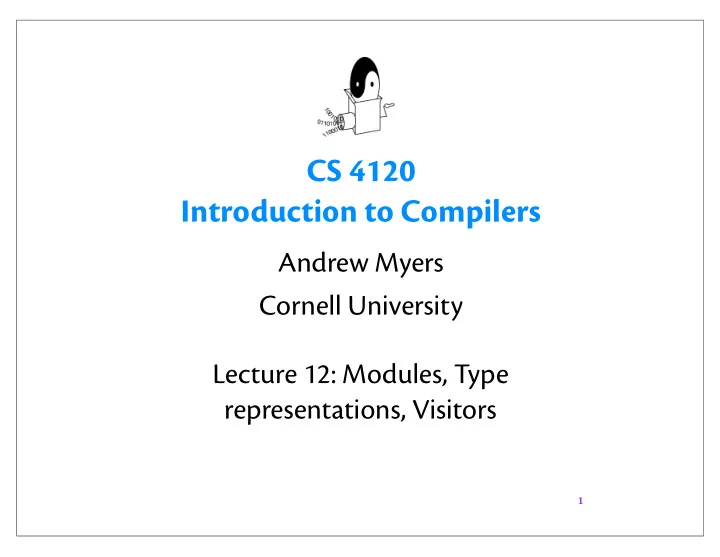

CS 4120 Introduction to Compilers Andrew Myers Cornell University Lecture 12: Modules, Type representations, Visitors 1
Structuring Analysis • Analysis is a traversal of AST • Technique used in lecture: recursion using methods of AST node objects—object- oriented style class Add extends Expr { Type typeCheck(SymTab s) { Type t1 = e1.typeCheck(s), t2 = e2.typeCheck(s); if (t1 == Int && t2 == Int) return Int; else throw new TypeCheckError(“+”); }} 2 CS 4120 Introduction to Compilers
Separating Syntax, Impl. • Can write each traversal in a single method Type typeCheck(Node n, SymTab s) { if (n instanceof Add) { Add a = (Add) n; Type t1 = typeCheck(a.e1, s), t2 = typeCheck(a.e2, s); if (t1 == Int && t2 == Int) return Int; else throw new TypeCheckError(“+”); } else if (n instanceof Id) { Id id = (Id)n; return s.lookup(id.name); … • (How we’d do it in a functional language) • Now, code for a given node spread all over! 3 CS 4120 Introduction to Compilers
Constant Folding • AST optimization: replaces constant expressions with constants they would compute • Traverses (and modifies) AST abstract class Expr { Expr foldConstants(); } class Add extends Expr { Expr e1, e2; Expr foldConstants() { e1 = e1.foldConstants(); e2 = e2.foldConstants(); if (e1 instanceof IntConst && e2 instanceof IntConst) return new IntConst(e1.value + e2.value); else return new Add(e1, e2); } 4 CS 4120 Introduction to Compilers
Redundancy • ere will be several more compiler phases like typeCheck and foldConstants –constant folding –translation to intermediate code –optimization –final code generation • Object-oriented style: each phase is a method in AST node objects • Weakness 1: code for each phase spread • Weakness 2: traversal logic replicated 5 CS 4120 Introduction to Compilers
Modularity Conflict • No good answer! • Two orthogonal organizing principles: node types and phases (rows or columns) typeCheck foldConst codeGen phases Add × × × Num × × × node types Id × × Stmt × × 6 CS 4120 Introduction to Compilers
Which is better? • Neither completely satisfactory • Both involve repetitive code – modularity by objects (rows): different traversals share basic traversal code—boilerplate code – modularity by operations (columns): lots of boilerplate: if (n instanceof Add) { Add a = (Add) n; …} else if (n instanceof Id) { Id x = (Id) n; … } else ... 7 CS 4120 Introduction to Compilers
Visitors • Idea: avoid repetition by providing one set of standard traversal code. • Knowledge of particular phase embedded in visitor object. • Standard traversal code is done by object methods, reused by every phase. • Visitor invoked at every step of traversal to allow it to do phase-specific work. 8 CS 4120 Introduction to Compilers
Visitor pattern class Visitor { void acceptFoo(Foo n) { } class Node { void acceptBar(Bar n) { } void accept(Visitor v); ... } } class FooNode extends Node { class XVisitor extends Visitor { void accept(Visitor v) { void acceptFoo(Foo n) { invoke accept(c) for every child c do whatever work pass X v.visitFoo(this); should do on Foo. } } } } 9 CS 4120 Introduction to Compilers
Polyglot Visitors • Allow rewriting AST lazily in functional style • Class Node is superclass for all AST nodes • NodeVisitor is superclass for all visitor classes (one visitor class per phase) abstract class Node { public final Node visit (NodeVisitor v) { Node n = v.override (this); // default: null if (n != null) return n; else { NodeVisitor v_ = v.enter(this); // default: v_=v n = visitChildren (v_); // visit children return v.leave(this, n, v_); // default: n }} abstract Node visitChildren(NodeVisitor v); 10 CS 4120 Introduction to Compilers
Folding constants with visitors public class ConstantFolder extends NodeVisitor { public Node leave (Node old, Node n, NodeVisitor v) { return n.foldConstants(); // note: all children of n already folded } } class Node { Node foldConstants( ) { return this; } } class BinaryExpression { Node foldConstants( ) { switch(op) {…} } } class UnaryExpression { Node foldConstants( ) { switch(op) {…} } } 11 CS 4120 Introduction to Compilers
Summary • Semantic analysis: traversal of AST • Symbol tables needed to provide context during traversal • Traversals can be modularized di ff erently • Visitor pattern avoids repetitive code • Read Appel, Ch. 4 & 5 • See also: Design Patterns ( e “Gang of Four book”) 12 CS 4120 Introduction to Compilers
Recommend
More recommend